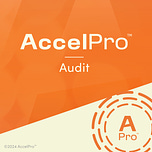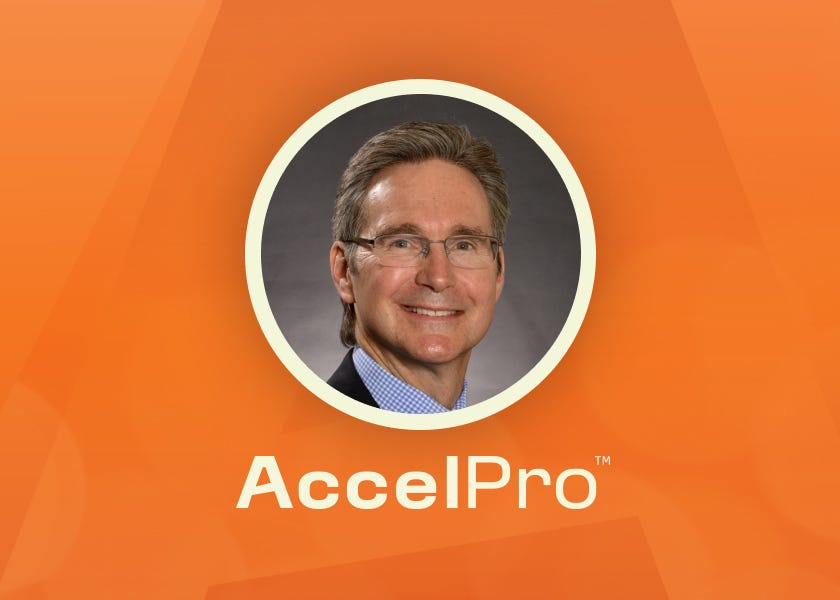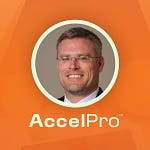Listen on Apple Podcasts, Spotify and YouTube
Welcome to AccelPro Audit, where we provide expert interviews and coaching to accelerate your professional development. Today we’re featuring a conversation with Tim Coville, Associate Professor of Accounting at St. John’s University.
ESG is an undoubtedly hot (if controversial) topic in the business world as companies and regulators wrestle with what businesses should disclose about their environmental and social impact, and exactly how. But despite all this noise and attention on the topic, CPA firms in North America currently handle a relatively small slice of ESG reporting and assurance work — just 15% according to Coville’s research. The rest goes to engineering firms and other consultants.
In this interview, Coville discusses why public accountants don’t win more business related to ESG reporting and what auditors should be doing now to prepare to handle more of this sort of work in the future. Putting on his educator’s hat, Coville also reveals what advice he gives students on finding a fulfilling path in the world of audit and how working in the ESG space has helped him find meaning in his career.
Listen on Apple Podcasts, Spotify and YouTube
Interview References:
Tim Coville’s St. John’s University profile.
Supplemental Materials:
The global standards for sustainability impacts. Global Reporting Initiative (GRI).
SASB Standards Knowledge Hub. International Financial Reporting Standards (IFRS).
New York State Society of CPAs Sustainability Accounting and Reporting Committee.
TRANSCRIPT
I. ON WHY ACCOUNTANTS DON’T GET MORE ESG REPORTING WORK
Jessica Stillman, Host: I understand your research investigates what kind of firms are getting hired to help companies with their ESG reporting and also whether accountants are being sufficiently trained to do this kind of work. Can you talk me through what you found?
Tim Coville: For one, in my investigations of what's being done with S&P 500 index companies, I'm finding that here in North America less than 15% of those third party assurance engagements related to sustainability metrics are going to public accounting firms, and my findings are very consistent with those of the International Federation of Accountants. They also see that in North America, we're unusually low at less than 15% of those engagements coming to public accounting firms, whereas globally, nearly 60% of engagements go to us public accountants. So I and my fellow travelers at the New York State Society of CPAs are also interested in seeing how we can earn more of this work in the future.
On the education front, some of it is newness of the subject matter. Only recently have CPAs been allowed sustainability reporting topics as continuing professional education. And of course, time is money. It's harder to allocate time beyond the already required CPE credits that you have to earn.
That's a current breakthrough, but it has held us back a bit in the past. Also, the accounting education curriculum at both the undergrad and the fifth year for many CPAs is a fairly dense, crowded curriculum where we're already expected to expand out into things like data analytics and computer tech skills layered on top of traditional financial information. So both those things have held back fitting ESG into the curriculum, even though organizations have been touting the need for it for about a decade now. The trend at least is our friend.
The trend is also our friend when it comes to audit engagements. The demand for them is growing and the public accounting firms winning those engagements is at least trending upward, even though a 15% number is not an impressive number yet.
JS: Why are so many companies opting to hire engineering firms or other consultancies rather than CPAs when they're looking for help with their ESG reporting?
TC: There's a few factors involved. One of the first and foremost is the fact that these disclosures have been out there on a voluntary basis. They're not part of mandatory regulatory filings and therefore some of the companies behind them feel as though they're probably already doing the public a favor of sorts.
They're doing something voluntarily and therefore they don't have that much liability exposure to making an error here and there, because after all, it's kind of a gift—a regulator didn’t say you must provide this information.
Also, those reports tend to get issued months later after a traditional financial regulatory required filings get issued, so we CPAs are not still on site when the client is ready to have their ESG, aka sustainability related metrics, looked at.
We accountants have decades of evolved regulation and standards around the steps we’re meant to take in order to provide an audit or a lesser level of assurance for review. There are quite extensive requirements: getting to know the client, getting to know their internal control processes, etc.
However, to come in and execute a third party verification of a client's calculation of their greenhouse gas equivalents, for example, that's a much less weighty assignment. It can often be conducted in much less time, and, of course, at a lower charge than an audit firm would have to charge because it'd have to be able to tick all those other boxes.
Quite a few things push clients in the direction of going for a cheaper solution while still being able to say, “Yes, I got third party assurance.” And some of those that asked for third party assurance are organizations like the CDP, it used to be known as the Carbon Disclosure Project, and they're willing to accept third party assurance from ISO engagements. It doesn't have to be an audit engagement.
You score points by being able to say, “Yes, I got third party outside verification or assurance about my calculation, my disclosures,” and that's true in some other organizations as well. GRI, the Global Reporting Initiative, they also ask people to say whether they got third party disclosure, but they don't declare that it needs to be done to a particular standard. Those things have allowed companies to go with cheaper solutions.
—
II. ON GETTING UP TO SPEED ON ESG AS AN AUDITOR
JS: You mentioned that the curriculum for accounting professionals and for continuing education is really crowded, so many auditors don't have a lot of preparation around ESG issues, sustainability. What would be your advice to audit professionals who are looking to get up to speed as these changes are coming at them?
TC: First and foremost, I would point them to the wealth of materials that various organizations are making available free of charge these days. All of the Big Four public accounting firms open access to their websites with quite a few white papers on the subject and other even curriculum materials.
Also, beyond the Big Four public accounting firms there are the sustainability framework reporting providers, such as the Global Reporting Initiative. They're quick to give away instructional materials and guidance. And SASB, the Sustainability Accounting Standards Board that was acquired last year by the International Financial Reporting Standards Foundation — they also are giving away lots of training material for free.
They want to charge you if you want a credential from them, such as the FSA or the GRl credential. Others are claiming credentials like the Global Association of Risk Professionals, but for the materials, the underlying knowledge, they're quick to give that away for free. Yes, some time and reading is involved, but there's not a heavy cost of buying these training materials.
It's a current development, that CPE credits can be earned. I personally would point out that the fundamentals of a sustainability accounting credential originally were offered by SASB, but are now sponsored by the IFRS people. I was a member of the first cohort of individuals to earn that credential back in 2017. I personally think it gives a great background for engaging with clients or students on the subject.
Another thought on getting up to speed is that even in the approach to clients, they should realize that they're more likely to appreciate sustainability when it's framed as part of their risk management responsibilities. Boards and executives understand they've had a long-standing requirement to care about risk management for their firms.
They're much more likely to be skeptical if they think it's being presented to them as some sort of do-gooder exercise—which, let's face it, some people do view this topic as being something of the sort. Anecdotally, there's evidence that some people are more triggered by ESG than they are by the word sustainability.
Sustainability is the sort of innocent meaning of wanting to sustain, whereas ESG has elements in it that some people would rather see as not relevant to corporate governance. So even presenting the information as about a risk management exercise flies a lot better from my experience and from my conversations with others in the area.
Clients should be alerted that these metrics are starting to be taken seriously by both banks and insurance companies in their underwriting loan approval and policy approval practices as an additional motivation for companies wanting to know they have their act together and can speak to these topics. It's an important fundamental risk management thing and not a community service to know these metrics, even short of them being mandated by a regulator.
I would also suggest that it's easier to begin your involvement by advising clients on how to implement ESG reporting than it is to start out in an audit engagement with them on those reports. And I think even the Big Four firms also have done a lot more in that area of advising and guiding clients on how to implement their sustainability reports than starting right out with a heavy audit or review of the items in those reports.
Even though we haven't been making a ton of money with that 15% number mentioned earlier in the area of audit engagements, we do see some of the firms making money with implementation, advising, and consultancy work.
JS: Are there key differences between standard auditing procedures and ESG reporting assurance that auditors might want to watch out for?
TC: I'd warn your listeners about some of the unique characteristics of an engagement focused on sustainability metrics as opposed to traditional financial metrics. The first of those would be boundaries. In financial accounting it's well understood the rules around what gets consolidated and reported, which is based on organizational clear ownership percentages, whereas in the world of sustainability reporting, people are often interested in knowing more about upstream and downstream impacts around your product.
The border for a sustainability report may move, instead of from an organizational level, out to an operational level. Who are you sourcing your inputs from? What happens to your product once it's out there in the public's hands—both in terms of its use and safety and also once it's disposed of? Boundaries for your reports are less clear than they are under financial reports.
Also, base year can be a unique consideration in that we accountants are used to issuing reports with comparative periods from the prior year, or maybe several prior years, but we're not used to having a client who declared, say, 10 years ago, that they were going to make a certain improvement. They've put their marker down in base year 2010, for example. That's a bit unique to us accountants to have to deal with. And there's more potential for inconsistencies, changes in the organization from that base year point in time.
Measurement uncertainty comes up because now we're not just dealing in labeling things in an amount of currency; now we're having to speak to things like injuries on the job, metric tons of CO2, metric gallons of water. We're getting involved in different measurements and in some cases there's a little bit of scientific engineering uncertainty. How much does a kilowatt hour of electricity translate into for CO2 gas equivalents, as an example.
Now we're no longer challenged to be competent at US GAAP or any international accepted accounting standard. We're also asked to become competent in the area of sustainability related metrics. And at times that'll force us into more use of outside experts. But we accountants have experience using outside experts. We've issued and audited financial statements for an oil and gas giant. We're hiring engineers to help us with the validity of those reserves that are being reported. We can do this.
We get back to that boundaries issue. If you're having to get evidence from somebody in an upstream supplier role, are they going to cooperate? Are you going to get access? It’s less clear than if what you're auditing is all contained within your client's record keeping.
Subject matter appropriateness: has the right subject matter been covered to satisfy the reader's needs? What criteria is going to be used to judge the report's validity and accurateness to standard understandings of what ought to be issued? We're no longer looking at a GAAP requirement. Now we're having to look at things like, what did the GRI people say should be done? Or, what is the European Commission requiring? It's not the clear, well-defined financial statement and it's footnote disclosures that we've come to know and love.
JS: It sounds like it might be an argument for some sort of mandatory standards, right? Because if there's so many different frameworks to choose from, that's got to be confusing for the auditor. Which one do I choose? Which one's appropriate?
TC: You are quite right. And that is, we think one of the reasons why the IFRS ended up acquiring SASB in the face of the challenge from the global business world of saying, “Who do we choose? What are we doing?” The World Economic Forum, the Davos conference people, challenged these organizations to “Come on, stop with the confusion, or we're going to ask that our members use these 40 metrics and get on with life.”
The plethora of different competing standard setters was part of the problem. All well intentioned by each of them, but they have been challenged and quite a bit of that alphabet soup has now been folded into the IFRS organization. TCFD and other climate Change Focus groups recently said they're going to trust in the new international sustainability standards board’s work to carry on their mission.
The alphabet soup is being reduced, but it's not completely eliminated. There is room for some confusion. And so it's another challenge, as you say to the auditor and to the business to decide, “Well, which of these am I going to follow?”
—
III. ON FINDING MEANING IN HIS AUDIT CAREER
JS: Can you talk me through how you got into the audit space and how you ended up where you are today, and also how you got interested in sustainability specifically?
TC: I came from fairly humble farming roots, which I think did help instill in me a love of nature. It also inspired me to join the military as a way of paying my way through college. It probably also played a role in my choosing a fairly risk averse career in public accounting straight out of college. My few years in the military as a paratrooper gave me, I think, the discipline to graduate with straight A's, and that transcript made applying for a PhD program later in life more feasible than it would've been, had I not matured up a bit.
After 20 years in the banking world as either a controller or risk manager with multiple international assignments, I decided to spend some of my savings on attending the Rutgers PhD program, and then enjoyed the good fortune of being hired by St. John's University as a tenured track faculty in the Department of Accountancy. Then about five years into my faculty work at St. John's University, I saw that both the AICPA and the ACSB, were promoting the incorporation of sustainability into the public accounting profession and our curriculum.
I studied for and earned that FSA credential, as I mentioned, back in 2017. And from then on, my involvement in the subject has only deepened. I'm now serving as the chairperson for the New York State Society of CPA's Sustainability Accounting and Reporting Committee.
So that’s how I flowed into this space, I very much enjoy it. I view it as kind of a breath of fresh air from the traditional dollars and cents, debits and credits. Certainly I'm grateful for my training in that area and my work in that area. But this is a nice, new area of involvement where I can see my contributions going broader than just a quality financial statement.
JS: You had in the course of your career, both some experience on the internal audit side and the external audit side. Could you share anything about the pros and cons of those two sides of things when it comes to managing your career development?
TC: My first experience was as an external auditor, and as an external auditor I really appreciated the sense of being the standalone professional. The ‘have a briefcase, will travel’ approach to feeling prepared, that I could go in, meet with a client, and add some value. The downside to me as an external auditor was the sense that I was only there for a defined period of time, after which the client may well decide to do whatever they chose to do with the findings or suggestions I had given them.
Whereas, as an internal auditor much later in my career, I was struck by how much I was listened to. This was partly due to being a much more seasoned professional at that point in time—arguably a bit more respect was to be expected than during my early public accounting days. But I feel it was also because there was not a clock ticking on the internal auditor's presence in the company.
They realized that things that got into our reports were going to be followed up on. It wasn't something where I'd need to leave in three weeks time. They knew that the stuff was to be addressed and dealt with over time, which helped my sense of the meaningfulness of that work.
Currently, I often highlight this to our students, not to talk them out of public accounting, but to assure them that there are many good opportunities out there in internal audit and many internal audit programs do provide the opportunity to tour around within the organization.
So there's a lot of good internal training and networking opportunities that come along with the internal audit experience, which can lead to line experience. You get drafted out of internal audit into, “Please manage this department for us. You seem to know it as well or better than some of our people that are already here.”
Listen on Apple Podcasts, Spotify and YouTube.
This AccelPro audio transcript has been edited and organized for clarity. This interview was recorded on July 14, 2023.
AccelPro’s expert interviews and coaching accelerate your professional development. Our mission is to improve your day-to-day job performance and make your career goals achievable.
Send your comments and career questions to questions@joinaccelpro.com. You can also call us at 614-642-2235.
If your colleagues in any sector of the audit field might be interested, please let them know about AccelPro. As our community grows, it grows more useful for its members.











